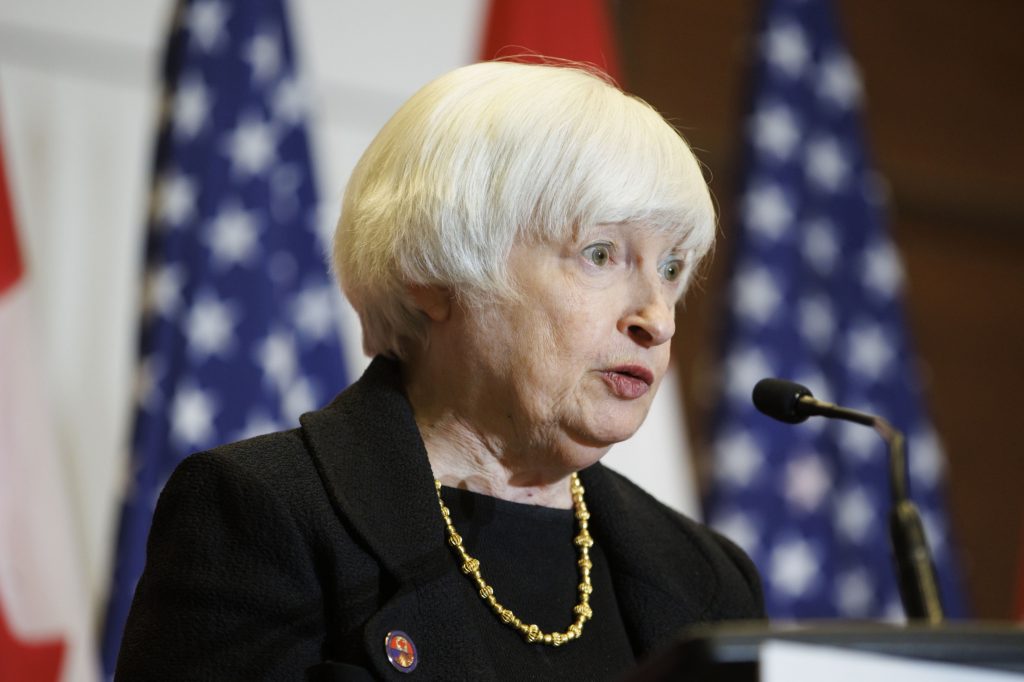 Janet Yellen, US Treasury secretary, speaks during a news conference on June 20, 2022.
Janet Yellen, US Treasury secretary, speaks during a news conference on June 20, 2022.
U.S. Treasury Secretary Janet Yellen said her plan to limit Russia's oil earnings can overcome fears among potential partners that President Vladimir Putin may retaliate. "What I heard was concern about retaliation," Yellen said Monday in an interview en route to Seoul, South Korea, after attending a gathering of Group of 20 (G-20) finance ministers in Bali, Indonesia.
Yellen said she addressed those concerns by pointing to the alternative if the price-cap scheme isn't put into place.
Recommended For You
"Russia's going to face an insurance and financial services ban at the end of the year that is going to end up shutting in between 3 and 5 million barrels, we estimate," she said. "So why should they retaliate for an initiative that enables their oil to continue to flow through to world markets at a price that is profitable?"

Yellen and her staff have been relentlessly pushing a proposal that would allow shipments of oil priced at or below some agreed-upon cap to obtain insurance and financing that will otherwise become prohibited. No ceiling level has been set, but proponents have suggested a price just above Russia's cost of production.
The plan is aimed at sharply reducing Moscow's earnings on oil while keeping it flowing onto global markets. The Treasury has estimated that a total shut-in of Russian oil would cause the global price to spike to around US$140 a barrel. Earlier this week, it hovered near $100 a barrel.
Treasury officials expect the European Union (EU), the U.K., and Switzerland to take part in the bans alongside the U.S. They believe other buyers won't be able to absorb more than a minority portion of Russia's exports, forcing Moscow to either sell the balance of its production at the cap or to shut down significant output. That would reduce Russia's oil revenue even more and cause long-term damage to wells.
Yellen and her staff, having studied insurance and reinsurance capacity outside the participating jurisdictions, as well as the number of tankers available and where they're flagged, think the services bans will be more effective than many critics believe.
She took that analysis to the G-20, where she presented it to finance ministers during bilateral meetings.
Mixed Reactions
"I generally heard reactions ranging from an openness to explore this more and discuss implementation details, or deal with a range of concerns that I think are manageable," Yellen said. "We've got an openness to doing this, a range of questions we need to get through to firm up commitments."
She hoped to see it in force by year-end, when the EU prohibits seaborne imports of oil and implements an insurance ban.
The Treasury chief also expressed concern over the spillovers around the world as the Federal Reserve moves aggressively to raise interest rates in its battle with stubbornly high inflation. Higher rates are drawing capital into the United States, strengthening the dollar against a range of foreign currencies.
To a point, that's expected and even helpful in lowering inflation in the U.S., but capital flows have begun to alarm several governments. The Bloomberg Dollar Spot Index hit a record high on July 14, with the greenback hitting multi-decade highs against currencies including the euro and the yen.
Because so much of cross-border trade worldwide is denominated in dollars, a much stronger U.S. currency is exacerbating inflation elsewhere and making it more difficult for poorer countries that carry dollar debt. Analysts have worried about a so-called "doom loop" in which the flight of capital—including not only money in financial markets but also on-the-ground investments—hurts emerging-market economies, spurring even more cash to seek the safe haven of dollar assets.
"We should be looking at those feedbacks and taking them into account," Yellen said in the interview. "With the dollar, it's natural there may be some risk aversion that's exacerbating a flight into safe assets in the United States."
While stressing that she was not commenting on current central bank policy, Yellen said Fed officials typically monitor the impact of policy on foreign countries and whether that can spill back on the United States.
"The Fed's congressional mandate is to focus on U.S. conditions, but what happens in other countries affects the United States and, at least to some extent, they do take it into account," she said.
Yellen has shown little sympathy, however, for potential intervention in currency markets by governments. Her first stop on the trip was Tokyo, where Japanese officials shared their worries of the yen's depreciation against the dollar. Yellen told reporters after her meetings there that the U.S. believes exchange rates should be market-determined and that intervention was justified only in "rare and exceptional circumstances."
In Bali, she also cautioned developing countries against intervention or imposing capital controls without first consulting the International Monetary Fund (IMF).
© Touchpoint Markets, All Rights Reserved. Request academic re-use from www.copyright.com. All other uses, submit a request to [email protected]. For more inforrmation visit Asset & Logo Licensing.



